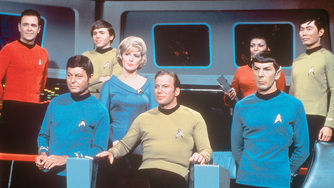 The original Star Trek crew (1966-69).
The original Star Trek crew (1966-69). “You’re supposed to be in bed, mister!”
“But Mom, the show’s almost over! Can’t I watch till the end? Pleeeeaase?”
A long silence, a scowl … then, if I was lucky and otherwise infraction-free, a reluctant surrender. “I suppose. But you’d better get right up for school in the morning!”
I would, and without complaint. Star Trek was that important to me.
One of television’s – indeed, America’s – great cultural icons turns 50 years old today. It was on this date in 1966 that the starship Enterprise sailed majestically across TV screens for the first time. Star Trek told the tale of a spaceship and its crew exploring the galaxy in the far future. It was serious science fiction, a far cry from the campy Lost In Space and many other genre productions of the era.
Star Trek was an expensive and risky venture for NBC and Desilu Productions, one that would die a relatively quick death after three seasons – and then endure in countless forms into the next century.
My love affair with Gene Roddenberry’s creation began around 1970, when Star Trek reruns went into syndication. I was eight years old. My family was an early adopter of cable TV, so I watched the adventures of Captain Kirk, Mister Spock, Doctor McCoy and the Enterprise crew in crisp, glorious color. As the opening theme played, my heart would surge with those first musical notes and the voice of actor William Shatner proclaiming, “Space … the final frontier.”
The show captured my imagination like nothing before. And the timing couldn’t have been better, as I was just starting to connect with the joy of writing. I soon began penning my own Trek adventures. These first efforts were the usual boyish fare – space battles, explosions, phaser fights. But as I grew, the deeper themes of Star Trek struck other, more thoughtful chords. I began to explore those ideas as well, far beyond the Trek universe, but always with Star Trek as my muse.
As much as I loved Trek, it was also a catalyst for darker events. My schoolmates neither understood nor supported my obsession, and their disdain was a daily burden. At times I stepped away from Trek, judging the pain too much to bear. But always I returned to that ship and crew; something about the show kept calling, nurturing, urging me to boldly go.
By the 1980s, Star Trek was a reinvigorated success on screens large and small. (To date, Trek has spawned six TV series [a seventh is due on CBS next year], 13 films, thousands of books, magazines, comics, games, conventions and much more.) Likewise, the writer within me emerged in young adulthood – first as a journalist, then as corporate communicator. In years to come, I would pen many short stories and articles, three novelettes and a full-blown novel, as well as episodes of an online science fiction anthology.
And then, in the summer of 2012, I lived a dream that my eight-year-old self, huddled next to that TV, could never imagine. I sat in a perfect recreation of the Enterprise bridge, watching as a script I wrote was turned into an independent fan production of Star Trek. I confess: I shed a tear when that first scene was shot.
The experience would happen again a year later with my second episode. And the year after that with my third. And the year after that with my fourth.
I still shake my head in disbelief when I think about it. Because of Star Trek, I lived the impossible – just like the Enterprise crew.
What is it about Star Trek that makes it so captivating?
I’m often asked this, and my response is usually three-fold. I tell people Star Trek has endured because it signified hope for the human race at pivotal moments in our recent history. It invites us – and even fools us – to face our biggest issues as a society, issues we’d otherwise ignore. And it has the capacity to tell great, timeless stories that resonate with our storytelling civilization.
But for me, there’s still more to it. It’s also an issue of timing and inspiration. Star Trek beamed into my psyche at just the right moment to set the course for my life – and I’m forever grateful for it.
“Second star on the right, straight on till morning.”

 RSS Feed
RSS Feed
